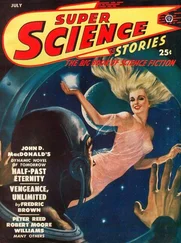“Leo? Don’t be silly. I had it all along. There were always two, you know. Don’t you remember that, even? No, keep it, dear. If I have to have it back, you can always give it to me. Without any fuss. Promise?”
“Sure, but if you could just tell me...”
“I can show you, Dave. Come along.”
She paused at the next turning and bit her lip, and standing beside her, he saw that the floor itself dipped down in a gentle curve and lifted again at another place in the distance, where it turned again. It was swaying slightly, the whole corridor, like the bridges primitive peoples wove across deep swift rivers. She told him to walk carefully and stay close to the corridor wall. She motioned to him to stop, and they were, he saw, on either side of a double door. It was room 4242. If she knew the rest of it, she would know the right number. It had been so placed that half of it was on each door, so that each was labeled 42. Even though she knew, he did not want her to watch what had to be done, watch the task assigned him; but before he could ask her to go away, to give him the key and go away, go back and wait for him around the corner, out of sight, she put a bright red key in the lock and the double doors opened inward.
Inward, but outward. They opened onto the nothing of a dizzy height, making a vent for a cold wind that came husking down the hallway behind him and pushed him a long clumsy stride to stand on the very brink. Far, far, far below, the bug shapes of city cars and trucks moved very slowly, as when seen from an aircraft. He teetered, toes over the edge, and slowly fought back the sickness and the terror, knowing he could not let her see that he suddenly realized how cynically and savagely they had tricked him. He adjusted himself to the slight sway of the corridor and rode it easily, smiling and casual for her benefit, aware of how narrowly she was watching him.
Then came a deep and powerful thud, more vibration than sound. It came welling up from below and it danced the swaying corridor, nearly toppling him out. It came again and again. He learned to ride the new motion. The girl whimpered. He looked far down, almost directly down, and said, “It’s nothing. Your friends have come to work. They’ve got some kind of a derrick thing down there and they’re swinging one of those big cannon balls against the foundation.”
He stepped back with care and reached and took her hand. Her hand was cold and hesitant. He led her past the open and windy space and back to where, once again, the structure was solid underfoot, trembling almost imperceptibly to each subsonic thud. She pulled her hand free and, after walking slowly, looking at the room numbers, chose one and opened the door, motioning him to come in. The room was in semidarkness, gray light outlining the window. She closed the door and he heard her sigh.
Reaction made him feel weak and sick. He saw the shape of the bed and moved to it and sat on the edge of it. She came to him and pushed at his shoulder and he lay back, grateful that she understood. He swung his legs onto the bed and she went to the foot and unlaced his shoes and took them off.
“We’d better not make very much noise,” she whispered.
“Of course.”
“Do you understand about the old people?”
“I know there’s something I’m supposed to understand.”
“That’s enough for now.”
She disappeared in the shadows, and then he saw her again in silhouette in front of the gray of the window. He heard her sigh, and he saw her, with a slow and weary motion, tug the shift off over her head, toss it aside, pat her rumpled hair back into order, then bend and slip her shoes off. She stood near the comer of the window, half-turned, standing quite still in silhouette, hips in relaxed and weary tilt, and he remembered one of the girls in that Degas print standing off at the side, standing in exactly the same position.
He knew she would turn and come to him but would not understand about what the weakness had done to him. He did not want to confess that kind of weakness to her.
He said, “Even when they do very tricky things, that doesn’t mean the rules are changed. We have to follow the rules, just as if everything were happening to someone else, to some people they want to keep, instead of to us. You did it their way, and you know there isn’t really any other way down from here. This is all we have left.”
“So if I knew all along?” she asked, prompting him.
“If you knew how it was going to be, then you had to know you were a part of it too.”
Not turning, still standing at the gray of the window, she said sadly, softly, “See? You keep understanding more and more of it. Sleep for a little while, darling. Then you’ll know the rest of it.”
At a few minutes past six, Dr. Samuel Barringer opened the door of room 11 in the intensive-care section. In the shadows of the room, he saw the young nurse standing in silhouette by the gray of the window, looking out, standing there with a look of wistful grace.
At the sound of the latch as he closed the door, she spun with a guilty start, greeted him in her gentle and formal morning voice, and handed him the clipboard with the patient’s chart and the notation she had made since his visit four hours earlier. He held it under the low light for a moment, handed it back to her, then reached through the orifice in the transparent side of the oxygen tent to gently place the pads of his first two fingers against the arterial throb in the slack throat. He stood in a half bow, his eyes closed, listening and measuring through his fingertips. He was a big blond bear of a man, simultaneously clumsy and deft, as bears can be.
The nurse stood, awaiting instructions. He told her he would be back in a few minutes, and he walked to the far end of the corridor, to the waiting room beyond the nurses’ station. Sylvia sat alone there, at the end of the couch by the lamp table, staring out the big window. The hospital tower was higher than the buildings to the west of it, and she could see the wide, slow river in the morning haze. Daylight muted the yellow glow of the lamp beside her.
She turned and saw him, and suddenly her dark eyes looked enormous and her face was more pale. “Sam? Is—”
“They didn’t call me back. I just came in and checked him, and I have a couple of others to check, and it’s standard procedure, Sylvie. No perceptible change.”
He walked past her to the big window and shoved his fists into his hip pockets and looked out at the new day.
After a little while, she said, “He’s been trying to take it easier since that little coronary. He really has. But you know how Dave is. He said he was going to weed his practice down to about eight very rich and nervous old ladies with minor ailments. Sam?”
He turned and looked at her, at the lean, mature vitality of her face. “What, honey?”
“What’s the prognosis, Sam?”
He shrugged his bear shoulders. “Too early to tell.” He looked out the window and saw a freighter being nudged into the channel by the tugs. He wished he were on it and that everybody on board was sworn never to tell Dr. Barringer where they were going or how long they’d be gone.
“Sam, please! That was a big one. Oh, God, I know that was a big one! Remember me, Sam? Eighteen years we three have known one another. I’m a nurse... was a nurse. Remember? You don’t have to pat me on the head, Sam.”
It was easy to remember the Sylvie Dorn of eighteen years ago, that chunky, flirtatious, lively girl, now a whip-slender matron, dark hair with the first touches of gray. Thirty-eight? Mother of Ricky, Susan, Timmy — godmother to his own pair of demons. And Dave is... was... is forty-two.
“Sam?” she said again.
He turned from the window and went lumbering to the couch, thinking of all the times you make this decision and then decide how to wrap words around it to match the person you tell. But this one was close to the past and all the years, close to the heart.
Читать дальше








![Джон Макдональд - Wine of the Dreamers [= Planet of the Dreamers]](/books/430039/dzhon-makdonald-wine-of-the-dreamers-planet-of-thumb.webp)
![Джон Макдональд - Finding Anne Farley [= Ring My Love with Diamonds]](/books/430180/dzhon-makdonald-finding-anne-farley-ring-my-lov-thumb.webp)
![Джон Макдональд - Area of Suspicion [= My Brother’s Widow]](/books/430260/dzhon-makdonald-area-of-suspicion-my-brother-s-thumb.webp)

